Ever found yourself staring at a stubborn pile of ash or a dauntingly dirty garage, wondering if your ordinary vacuum cleaner can handle the task?
Well, you’re not alone. Selecting the right tool for your cleaning needs is paramount, but with an array of options available, it can get overwhelming.
Shop Vacs and Ash Vacuums are two popular choices that often compete for attention, each showcasing their unique features and functions. But which one is right for you?
That’s the million-dollar question! In this comprehensive guide, we’ll delve into the depths of these two cleaning powerhouses, helping you make an informed decision.
So, buckle up as we embark on this enlightening journey of vacuum selection!
Key Takeaways
- Understanding the Tools: Shop Vacs and Ash Vacuums are two different types of vacuums designed for distinct purposes. Shop Vacs are versatile, handling both wet and dry messes, and are suitable for a wide range of tasks. Ash Vacuums, on the other hand, are specialized tools specifically designed for the safe cleanup of ash and fine debris from fireplaces, wood stoves, and grills.
- Performance and Efficiency: While both types of vacuums can perform well in their designated tasks, Shop Vacs aren’t safe or efficient for ash cleanup due to potential filter clogging, motor damage, and fire risks. Ash Vacuums excel in handling ash, offering effective filtration systems and metal constructions to resist heat.
- Price and Value: Shop Vacs and Ash Vacuums come in a variety of models with differing prices. Your decision should factor in not just the upfront cost, but also the value it offers in terms of performance, durability, and alignment with your specific needs.
- User Experience: Real-life user experiences and reviews can provide valuable insights into the functionality and reliability of different Shop Vac and Ash Vacuum models.
- Making the Right Decision: Choosing between a Shop Vac and an Ash Vacuum should depend on your individual needs. Assess your routine cleaning tasks, the kind of debris you mostly deal with, and safety considerations before making a purchase.
Table of Contents
- Shop Vac vs Ash Vacuum: Which Vacuum is Right for Your Specific Needs?
- Understanding Vacuums: Basic Principles
- Shop Vac: A Detailed Examination
- Ash Vacuum: A Comprehensive Review
- Shop Vac vs. Ash Vacuum: A Comparative Study
- User Experience: Real-life Experiences and Reviews
- Making the Decision: Which One to Choose?
- Final Thoughts: The Verdict
- FAQ
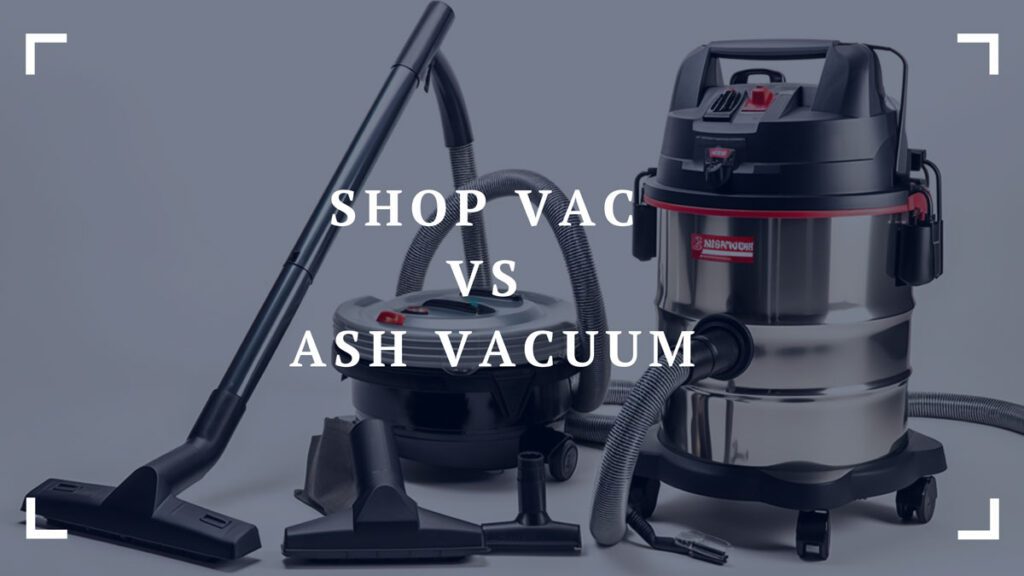
Comparison Table: Shop Vac vs Ash Vacuum
| Feature | Shop Vac | Ash Vacuum |
|---|---|---|
| Designed For | Wet and dry messes, general cleaning tasks | Dry ash and fine debris from fireplaces, wood stoves, grills |
| Filter System | Fine-dust filter (not suited for ash) | Fine-dust filter, often with additional layers for ash containment |
| Capacity | Large, varies by model | Typically smaller than Shop Vacs, designed for specific task |
| Material | Plastic or stainless steel | Primarily metal to resist heat |
| Safety Considerations | Not safe for hot or cold ash | Safe for ash cleanup, with metal canister and heat-resistant components |
| Noise Level | Can be loud, though quieter models are available | Generally quieter, but can vary by model |
| Maintenance | Regular filter cleaning/replacement, can be used without a filter for certain tasks | Regular filter cleaning, not designed to be used without a filter |
Shop Vac vs Ash Vacuum: Which Vacuum is Right for Your Specific Needs?
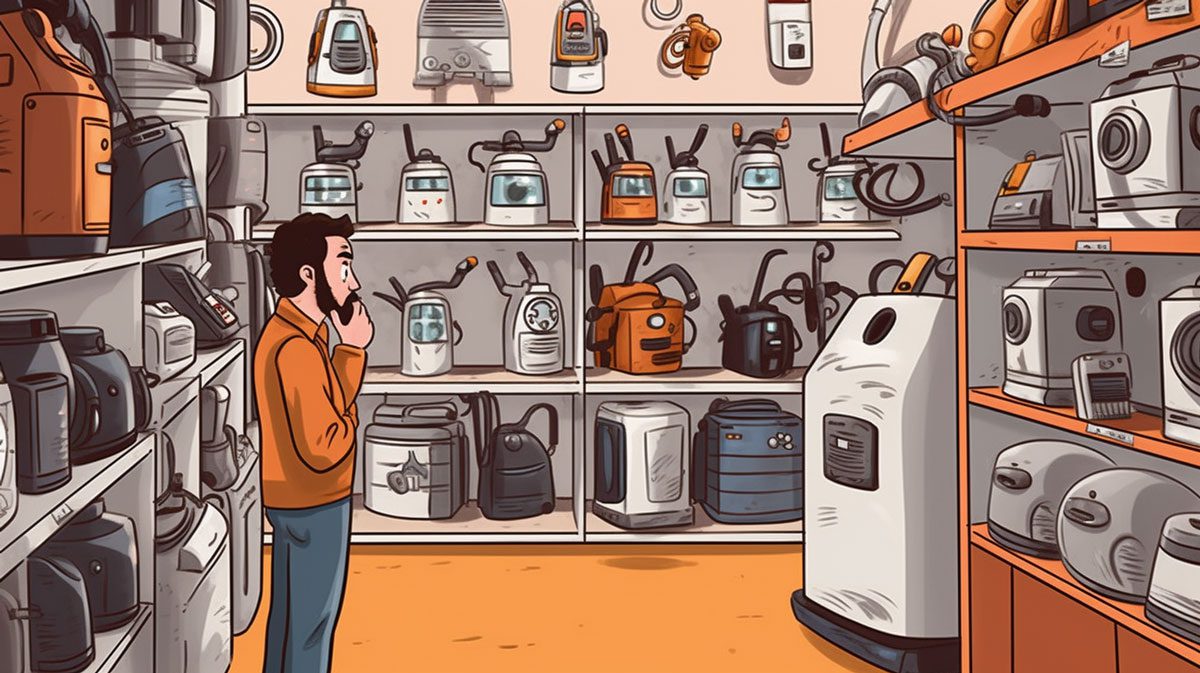
The Importance of Choosing the Right Vacuum for Specific Tasks
Hi there, have you ever wondered why picking the right vacuum cleaner for your task is so crucial? Well, it’s simple. Different vacuum types are designed to handle unique tasks, and using the wrong one can make your job a lot harder than it needs to be. It can also cause damage to your vacuum or, worse, a potential safety risk. It’s like using a hammer when you need a screwdriver – it just won’t work efficiently.
This is particularly true when we’re talking about Shop Vacs and Ash Vacuums. Let’s dive deeper into the world of these specialized tools.
A Brief Overview of Shop Vac and Ash Vacuum
Shop Vacs, also known as wet/dry vacuums, are an incredibly versatile tool that you’ll find in many homes, garages, and workshops. They’re designed to handle both wet and dry messes, making them ideal for a variety of cleanup tasks.
On the other hand, Ash Vacuums are designed to deal with a specific task: cleaning up ash from fireplaces, pellet stoves, and barbecues. Their built-in filters are designed to handle the fine particles that you find in ash, ensuring that it doesn’t escape back into the air.
But how do these vacuums work, and what makes them unique? Let’s find out!
Understanding Vacuums: Basic Principles
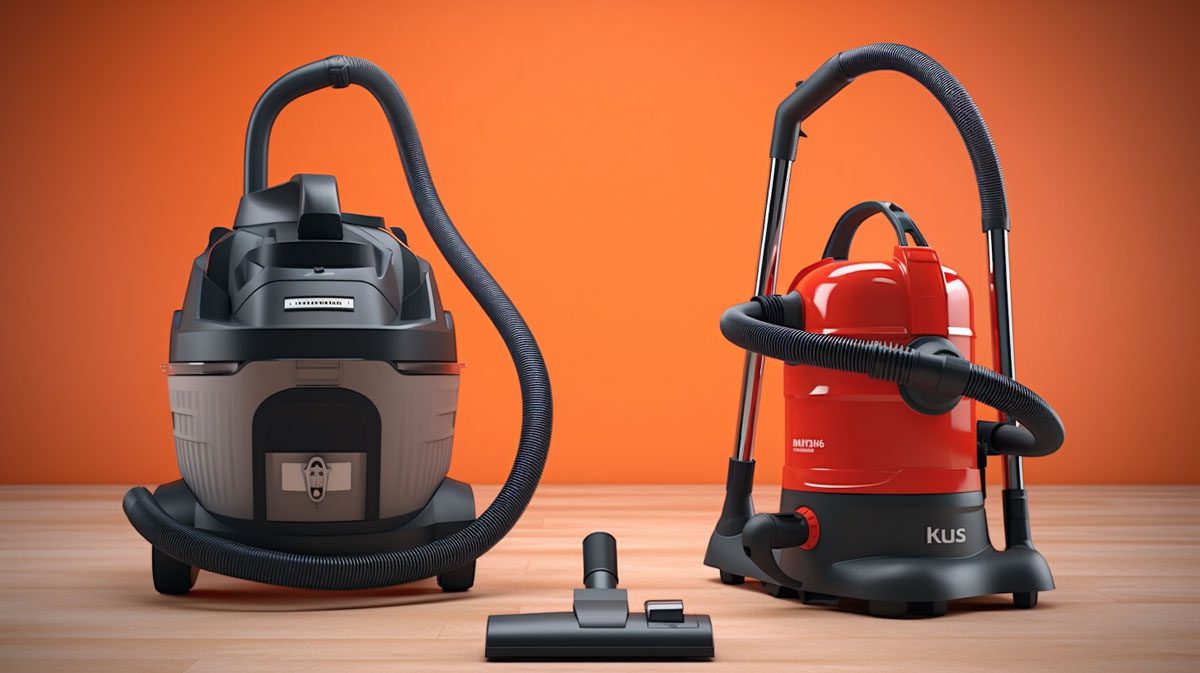
Working Mechanism of a Vacuum
Whether we’re talking about a Shop Vac or an Ash Vacuum, the basic principle remains the same. Both create a vacuum (hence the name), which creates suction that allows them to pick up dirt and debris. The motor drives a fan, which forces air out of the vacuum. As the air is forced out, it creates an area of low pressure, and air rushes in to fill that space, carrying dirt and debris with it. This is why you might have trouble using a Shop Vac without a filter; the filter catches the dirt while the air is expelled back out.
Various Types of Vacuums: A Quick Glimpse
There’s a whole world of vacuums out there, each designed for specific tasks:
- Upright vacuums: These are the classic vacuums you’re likely familiar with, perfect for general home use.
- Canister vacuums: These vacuums have a separate canister and wand, making them great for hard-to-reach areas.
- Handheld vacuums: These are small, portable, and great for quick, small cleanups.
- Robotic vacuums: These are automated vacuums that clean your floors on their own.
- Shop Vacs (wet/dry vacuums): As we mentioned, these are super versatile, great for wet and dry messes, and perfect for heavy-duty cleanup tasks.
- Ash Vacuums: Specifically designed to handle the fine particles found in ash.
In the next sections, we’ll go in-depth into Shop Vacs and Ash Vacuums, comparing their features, use cases, and helping you decide which one is best for your needs.
Shop Vac: A Detailed Examination
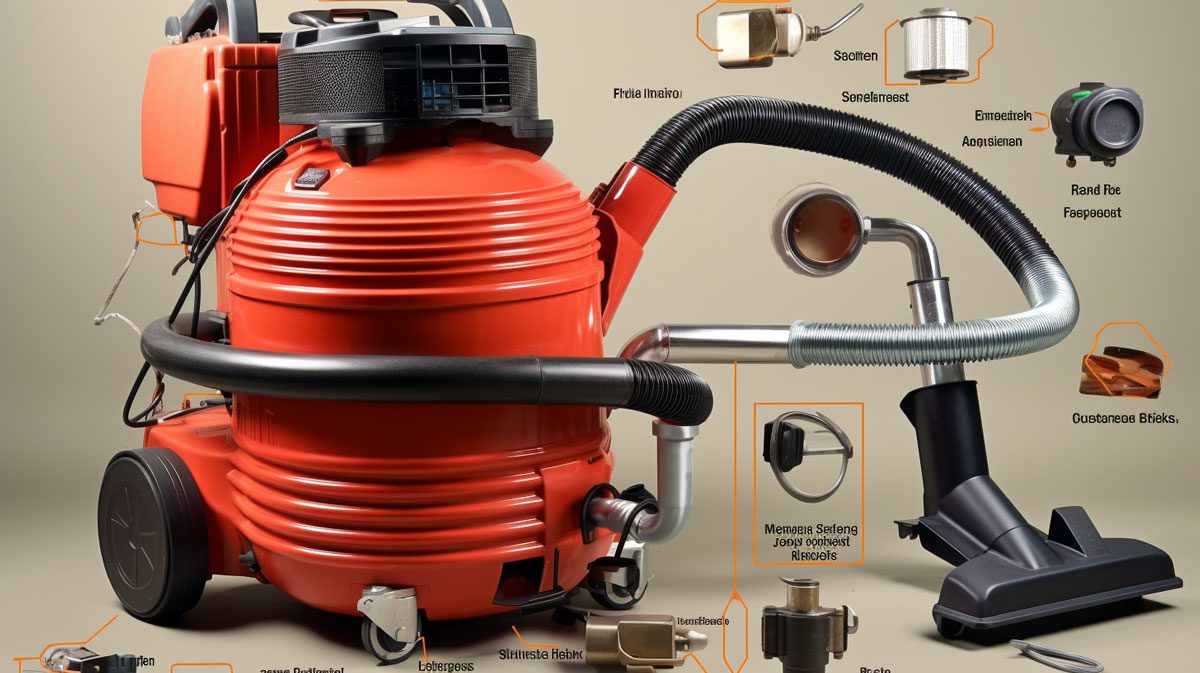
What is a Shop Vac: An In-depth Definition
Let’s begin by understanding what a Shop Vac is. A Shop Vac, also known as a wet/dry vacuum, is a high-capacity, versatile, and powerful vacuum cleaner. It is engineered to handle large-scale cleanup jobs, including both dry and wet materials, hence the name wet/dry vacuum.
Shop Vacs are typically larger and more robust than your average home vacuum. They are designed to pick up everything from dust and dirt to larger debris like wood chips and small metal parts. Some models can even pick up broken glass and act as a water pump in case of flooding.
Features and Functions of a Shop Vac
A Shop Vac comes with several unique features and functions that differentiate it from your standard home vacuum:
- Powerful suction: Shop Vacs are known for their robust motors, which provide substantial suction power.
- Wet/dry functionality: They can clean up both dry and wet messes, making them highly versatile.
- Large capacity: Shop Vacs often come with larger containers to hold more waste.
- Built-in blower port: Some models have a blower function, which can be useful for tasks like clearing leaves.
- Durable construction: They’re designed to handle tough jobs, so they often have a more durable construction than a typical home vacuum.
Benefits of Using a Shop Vac
The unique features of a Shop Vac offer several advantages:
- Versatility: Whether it’s a wet or dry mess, large or small debris, a Shop Vac can handle it all.
- Durability: Shop Vacs are built to last and to endure tough cleanup tasks that a regular vacuum can’t handle.
- Large capacity: With their large containers, you can clean up more before you have to empty it.
- Powerful suction: The strong motor ensures efficient cleaning, even for heavier debris.
Potential Drawbacks of a Shop Vac
Despite the advantages, there are a few potential drawbacks to be aware of:
- Size: Shop Vacs are larger and heavier than regular vacuums, making them less convenient to move and store.
- Noise: They can be quite loud due to the powerful motors. If noise is a concern, you might want to look for a quiet Shop Vac model.
- Overkill for some tasks: If you’re just doing regular home cleaning, a Shop Vac might be more than you need.
Ideal Use-Cases for a Shop Vac
Shop Vacs shine in situations where other vacuums wouldn’t be practical:
- Workshops and garages: These areas often have heavier debris that a regular vacuum couldn’t handle.
- Home renovation projects: The ability to pick up larger debris like wood chips and small metal parts is extremely handy.
- Flooding situations: The capability to handle water makes Shop Vacs useful in case of leaks or floods.
- Outdoor use: The blower function and the ability to handle larger debris make Shop Vacs a great choice for outdoor cleanup tasks.
Popular Shop Vac Models: A Comparative Analysis
Different Shop Vac models offer various features and capacities. Some popular models include:
- Shop-Vac 5989300: A versatile and durable choice with a 5-gallon capacity, suitable for most home and garage cleanup tasks.
- Craftsman CMXEVBE17595: Known for its large 16-gallon capacity and high power, ideal for heavy-duty tasks.
- DeWALT DXV10P: Offers powerful performance in a portable design, with a built-in blower port.
Each model has its strengths and weaknesses, so the best one for you depends on your specific needs.
Ash Vacuum: A Comprehensive Review
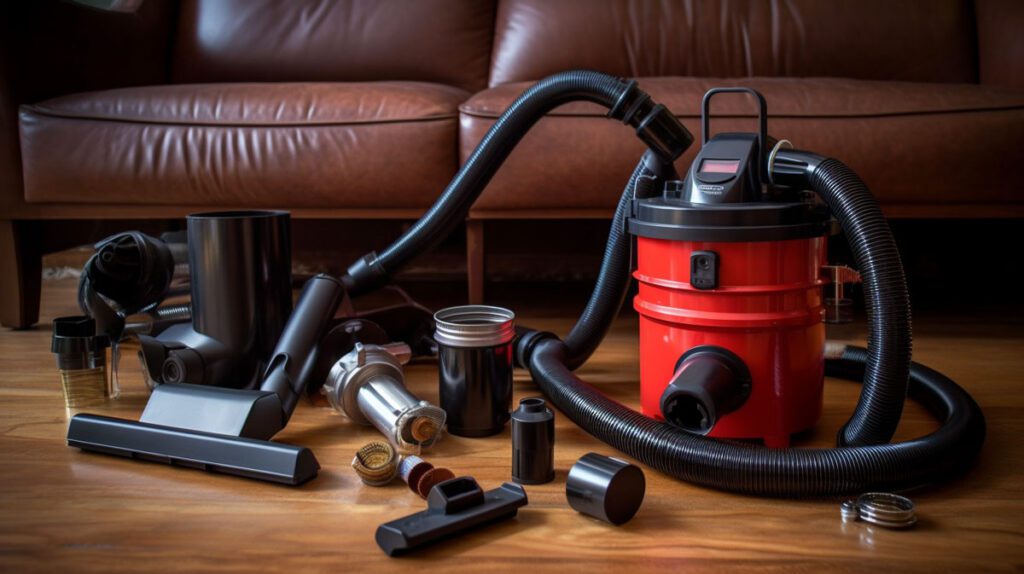
Defining an Ash Vacuum: Understanding the Basics
An Ash Vacuum is a specialized type of vacuum cleaner specifically designed to clean up ash from fireplaces, pellet stoves, and barbecue grills. They’re equipped with metal bodies and components to withstand the heat of the ash and are insulated to prevent the fine ash particles from escaping the vacuum.
Ash Vacuums are different from regular vacuums and even Shop Vacs because hot or cold ashes can be problematic if not handled with a device designed for them. Using a regular vacuum for ashes can damage the vacuum and potentially lead to a fire hazard.
Key Features and Functions of an Ash Vacuum
Ash Vacuums come equipped with a unique set of features and functions:
- Heat-resistant components: The body, hose, and nozzle are typically made of metal to withstand high temperatures.
- Fine dust filter: A specially designed filter traps the tiny ash particles and prevents them from being released back into the air.
- Quiet operation: Many models are designed to operate quietly, reducing noise pollution.
- Sealed design: Ash Vacuums are sealed to prevent ash from escaping the vacuum.
Advantages of Using an Ash Vacuum
Ash Vacuums bring a number of benefits to the table:
- Safe ash removal: They provide a safe and effective method for removing ash from fireplaces and grills.
- Prevention of ash dispersion: Their sealed design and fine dust filter keep ash contained and prevent it from spreading around your home.
- Durable construction: They are built to handle the harsh conditions of ash cleanup.
Possible Downsides of an Ash Vacuum
Despite their benefits, Ash Vacuums also have some potential drawbacks:
- Limited application: They are specifically designed for ash cleanup, which limits their usage scenarios.
- Size: Similar to Shop Vacs, Ash Vacuums can be larger and heavier than regular vacuums.
Perfect Scenarios for Using an Ash Vacuum
Ash Vacuums excel in specific scenarios:
- Cleaning fireplaces: This is the most common use for an Ash Vacuum.
- Maintaining pellet stoves: Ash Vacuums are ideal for cleaning out pellet stoves.
- Barbecue grill cleanup: After a barbecue, an Ash Vacuum can safely and efficiently clean up the ash.
Leading Ash Vacuum Models: A Side-by-Side Comparison
There are several leading models in the market for Ash Vacuums:
- PowerSmith PAVC101: This model is known for its powerful suction, quiet operation, and 10 Amp motor. It also comes with a heat-resistant metal hose and container.
- Snow Joe ASHJ201: A versatile model featuring a reusable fine dust cartridge that resists clogging and is easy to clean. It has a 4.8 gallon tank capacity.
- Shop-Vac 4041300 Ash Vacuum: From the well-known Shop-Vac brand, this model comes with a thermal protective device for added safety.
Choosing the right model depends on your specific needs and the amount of ash cleanup you have to perform regularly.
Shop Vac vs. Ash Vacuum: A Comparative Study
Functional Differences: Shop Vac vs. Ash Vacuum
The primary functional difference between a Shop Vac and an Ash Vacuum lies in their specific use cases. While a Shop Vac is a versatile cleaning tool for a wide range of messes, an Ash Vacuum is specially designed for ash removal. This difference in functionality means that they each excel in different scenarios.
A Shop Vac is equipped to handle both dry and wet messes, and its robust motor and design allow it to pick up larger debris, even broken glass or nails, a task an Ash Vacuum isn’t built to handle. On the other hand, Ash Vacuums are designed with heat-resistant components and fine filters specifically for safe and efficient ash cleanup.
Performance Factors: Cleaning Efficiency and Power
Both Shop Vacs and Ash Vacuums offer high cleaning efficiency and power. Shop Vacs, with their powerful motors, are capable of tackling larger and more robust debris, making them ideal for workshop or construction site cleanups. Ash Vacuums, while not designed for large debris, excel in their niche. Their specialized filters capture fine ash particles, making them perfect for cleaning fireplaces, grills, and stoves.
Safety Considerations: Which One is Safer?
Safety in vacuum usage is often dependent on using the right tool for the right job. While Shop Vacs are generally safe for a variety of cleanup tasks, they can pose a hazard if used for hot ash cleanup, as their plastic components and standard filters aren’t designed to handle hot ash.
On the other hand, Ash Vacuums are explicitly designed for safe ash removal. Their metal components resist high temperatures, and their sealed designs and specialized filters prevent fine ash particles from being released into the air or causing damage to the vacuum itself.
Maintenance and Longevity: Comparing Durability and Care Requirements
Maintenance and longevity can be largely dependent on the specific model and how it’s used. Both Shop Vacs and Ash Vacuums are designed to be robust and durable.
Shop Vacs require regular filter changes, especially when used for fine dust cleanup (source). If the filter becomes clogged, it may cause the vacuum to blow out air, but this is usually easily fixed by replacing the filter (source).
Ash Vacuums also require regular filter changes and cleaning to ensure their fine dust filters remain effective. Properly maintaining your vacuum can significantly improve its lifespan, whether it’s a Shop Vac or an Ash Vacuum.
Price Comparison: Assessing Cost and Value
When it comes to cost, Shop Vacs and Ash Vacuums can range widely in price, depending on their features, capacity, and brand.
Generally, Shop Vacs can be more cost-effective, especially considering their versatility. If you’re looking for a vacuum that can handle a variety of cleanup tasks, from liquid spills to large debris, a Shop Vac is a great value. On the other hand, if you frequently need to clean up ash, investing in an Ash Vacuum may be worth the cost for its specialized capabilities.
Remember that while price is an important factor, it’s essential to consider the value the device will provide in your specific situation. Your individual needs should be a significant driver in deciding which vacuum is the right choice for you.
User Experience: Real-life Experiences and Reviews
Customer Reviews: What Users Say About Shop Vacs
Shop Vacs have earned widespread popularity due to their versatile usage and powerful suction capability. Users love the ability to switch between wet and dry mess cleanup seamlessly, and the option to handle large debris is appreciated by many.
One user mentioned how their Shop Vac was a “lifesaver” when their basement flooded, thanks to the ability to use it as a water pump (source). Another customer praised the efficiency of their quiet Shop Vac model, noting its impressive suction power and reduced noise levels during operation (source).
However, some users have raised concerns about the maintenance requirements of Shop Vacs. Regular filter changes are necessary, especially when dealing with fine dust, to keep the vacuum running optimally. If not, it may result in the vacuum blowing out air, as one user pointed out (source).
Customer Reviews: User Opinions on Ash Vacuums
Ash Vacuums, while more niche in their usage, have also garnered positive reviews from users who frequently deal with ash cleanup. Many users appreciate the heat-resistant design and fine filters that allow them to safely and effectively clean their fireplaces, pellet stoves, and grills.
One customer described their Ash Vacuum as a “game changer,” making the ash cleanup process much more manageable and less messy. The fact that the vacuum prevents ash from being dispersed into the air during cleanup is a point of praise for many users.
On the other hand, some users note that while Ash Vacuums are excellent for their specific use-case, they lack the versatility that a Shop Vac offers. It’s also crucial to remember that Ash Vacuums are not designed to handle large debris, and attempting to use them for such tasks could lead to damage.
Overall, the reviews indicate that both Shop Vacs and Ash Vacuums are well-received for their intended uses. Your personal requirements and usage scenarios should guide your choice between these two vacuum types.
Making the Decision: Which One to Choose?

Factors to Consider Before Making a Purchase
When deciding between a Shop Vac and an Ash Vacuum, several factors need to be weighed. While both devices have their strengths and weaknesses, your choice should ultimately depend on your specific requirements. Let’s look at some of the primary aspects to consider:
- Purpose of use: The most crucial factor is what you intend to clean. For general home and workshop cleaning or for cleaning up large and wet debris, a Shop Vac is the clear choice. If, however, you regularly need to clean up ash from fireplaces, pellet stoves, or grills, an Ash Vacuum is the safer and more effective option.
- Frequency of use: How often you’ll use your vacuum can also play a significant role in your decision. If you need a vacuum for occasional cleanup tasks, a Shop Vac would be a suitable option. But, for more frequent, specific tasks such as ash cleanup, an Ash Vacuum would serve you better.
- Budget: Cost is always a determining factor when making a purchase. Shop Vacs, due to their more generic nature, can range widely in price, while Ash Vacuums, being more specialized, might come with a higher price tag.
- Maintenance: Both types of vacuums require maintenance, but the requirements differ. Shop Vacs may need regular filter changes, especially when used for fine dust (source). In contrast, Ash Vacuums might require less frequent, but more specialized maintenance due to their unique design for handling hot ash.
Deciding Based on Specific Needs and Use Cases
Once you’ve pondered the factors above, the next step is to align them with your specific needs and use cases. Here are a few scenarios to consider:
- If you’re a homeowner with general cleaning requirements, including occasional wet messes or large debris, a Shop Vac will be more versatile and cost-effective for you.
- For those in woodworking or construction industries, a Shop Vac is an excellent choice because of its power and ability to handle larger debris.
- If you have a fireplace or wood-burning stove at home and need to clean up ash regularly, an Ash Vacuum is a must. Its specific design for ash cleanup will provide a safer, more efficient cleaning process.
- For grill enthusiasts who frequently need to clean out their grills, an Ash Vacuum can make the task easier and safer.
In conclusion, the decision between a Shop Vac and an Ash Vacuum should be based on your individual needs. Both types of vacuums serve different purposes and excel in their respective areas. By considering your intended use, frequency of use, budget, and maintenance preferences, you can make an informed choice that suits your needs the best.
Final Thoughts: The Verdict
Summarizing the Shop Vac vs. Ash Vacuum Debate
The journey through the world of vacuums, specifically Shop Vacs and Ash Vacuums, has been quite a revealing one. We’ve explored their features, advantages, and potential drawbacks. We’ve also considered their ideal use-cases and assessed real-life customer reviews.
In summary, Shop Vacs are the jack-of-all-trades in the vacuum world. They handle a wide variety of cleaning tasks and are ideal for general home and workshop use. They offer excellent versatility and can deal with both large and small debris, as well as wet messes. However, they can be noisier and require regular maintenance, especially when dealing with fine dust.
On the other hand, Ash Vacuums are the specialists. They are designed to handle hot or cold ash safely, making them ideal for fireplaces, pellet stoves, and grills. They are typically quieter and offer specific features to safely handle ash cleanup, but may be more expensive and less versatile for general cleaning tasks.
Personal Recommendations and Suggestions for Users
When it comes to making a choice between a Shop Vac and an Ash Vacuum, consider your individual needs first. If your cleaning tasks primarily involve ash, an Ash Vacuum is undoubtedly the safer and more efficient option. However, for more general cleaning tasks, a Shop Vac will offer more versatility and cost-effectiveness.
For those who have mixed needs – some general cleaning and some ash cleanup – it might be worth considering investing in both types of vacuums. That way, you can ensure efficient, safe cleaning for all types of debris and messes, protecting both your health and your home.
In the end, there is no ‘one-size-fits-all’ solution. Your choice should ultimately reflect your specific requirements, your budget, and your preferences in terms of maintenance and ease of use. By considering these factors, you can make an informed choice that will serve you well in the long run. Happy vacuuming!
FAQ
Can I use a regular vacuum instead of an Ash Vacuum for fireplace cleanup?
While you technically could use a regular vacuum, it is highly discouraged. Regular vacuums aren’t designed to handle the fine ash particles which can clog filters, damage the motor, and even pose a fire hazard if the ashes are still hot. An Ash Vacuum is specifically designed to handle this kind of task safely and efficiently.
Can I convert my Shop Vac into an Ash Vacuum?
Shop Vacs are versatile, but they aren’t designed to handle hot or cold ash like an Ash Vacuum. Even with modifications, a Shop Vac may not perform as well as a purpose-built Ash Vacuum for ash cleanup. There’s also the risk of damage to the Shop Vac or even a potential fire hazard.
Are there multi-purpose vacuums that can handle general cleaning and ash cleanup?
There are a few multi-purpose vacuum models on the market that claim to handle both general cleaning and ash cleanup. However, they may not perform as well in specialized tasks compared to dedicated vacuums like Shop Vacs and Ash Vacuums. Always research thoroughly and consider your specific needs before making a purchase.
Can an Ash Vacuum clean wet messes like a Shop Vac?
No, Ash Vacuums are designed specifically for handling dry ash. They aren’t equipped to handle wet messes. Conversely, Shop Vacs are designed to manage both wet and dry messes, which is part of their versatility.
How often should I replace or clean the filters on my Shop Vac or Ash Vacuum?
This can vary based on usage and the specific model of your vacuum. As a general rule, check your vacuum’s filter after each use. If it appears dirty or clogged, it’s time for a clean or replacement. Always follow the manufacturer’s instructions for filter maintenance to ensure your vacuum’s performance and longevity.


